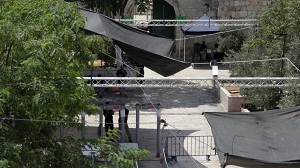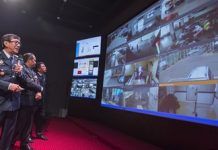Israel installed new security cameras at the entrance to a sensitive Jerusalem holy site, as officials began indicating it was considering “alternatives” to the metal detectors at the contested shrine that set off a weekend of violence and raised tensions in the region.
Israel set up the new security measures last week after Arab gunmen opened fire from the shrine, killing two Israeli policemen. It said they were a necessary measure to prevent more attacks and were deployed routinely at holy sites around the world. But Muslims alleged Israel was trying to expand its control at the Muslim-administered site and have launched mass prayer protests.
Three Palestinians were killed in street clashes in some of the worst street violence in years, and later a Palestinian stabbed to death three members of an Israeli family. Maj. Gen. Yoav Mordechai, who heads the Israeli defense body for Palestinian civilian affairs, said Israel was open to alternatives to lower the tensions. The only thing we want is to ensure no one can enter with weapons again and carry out another attack,” he said. “We’re willing to examine alternatives to the metal detectors as long as the solution of alternative ensures the prevention of the next attack.”
However, the Mufti of Jerusalem, Sheikh Muhammad Hussein, told the Voice of Palestine he demands a complete return to procedures that were in place before the initial attack at the shrine, known to Muslims as the Noble Sanctuary and to Jews as the Temple Mount. In a statement, the Islamic institutions in Jerusalem, of which he is a part, said they “affirm the categorical rejection of the electronic gates and all the measures of occupation.”
Disputes over the shrine, revered by Muslims and Jews, have set off major rounds of Israeli-Palestinian confrontations in the past. Israel has yet to comment on the new cameras and whether they offered a chance to restore calm. A top adviser to Palestinian President Mahmoud Abbas said he was holding consultations with various countries, including Jordan, Saudi Arabia, Egypt and Morocco, about the crisis








